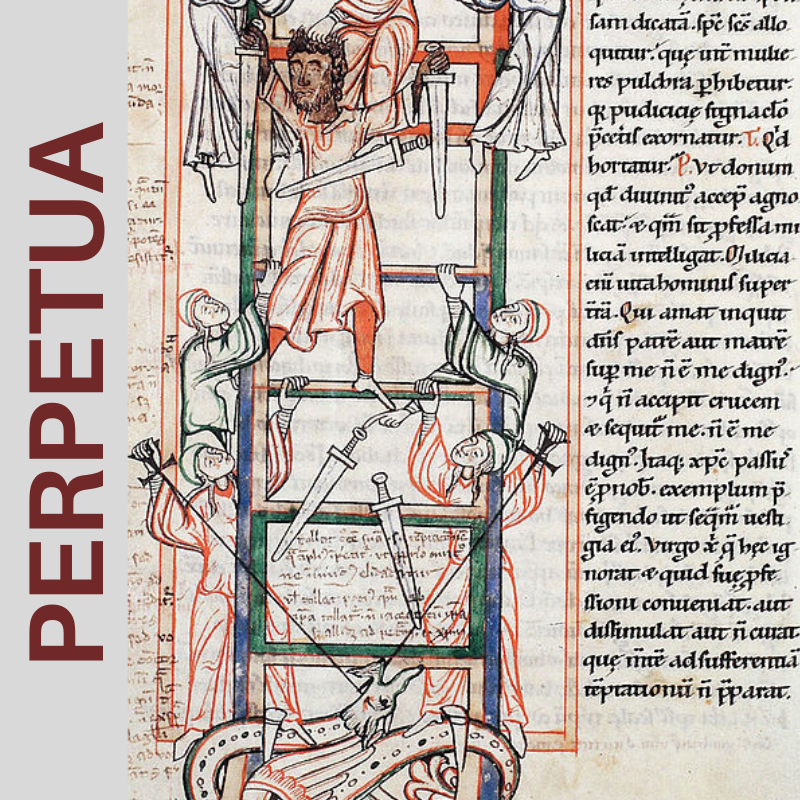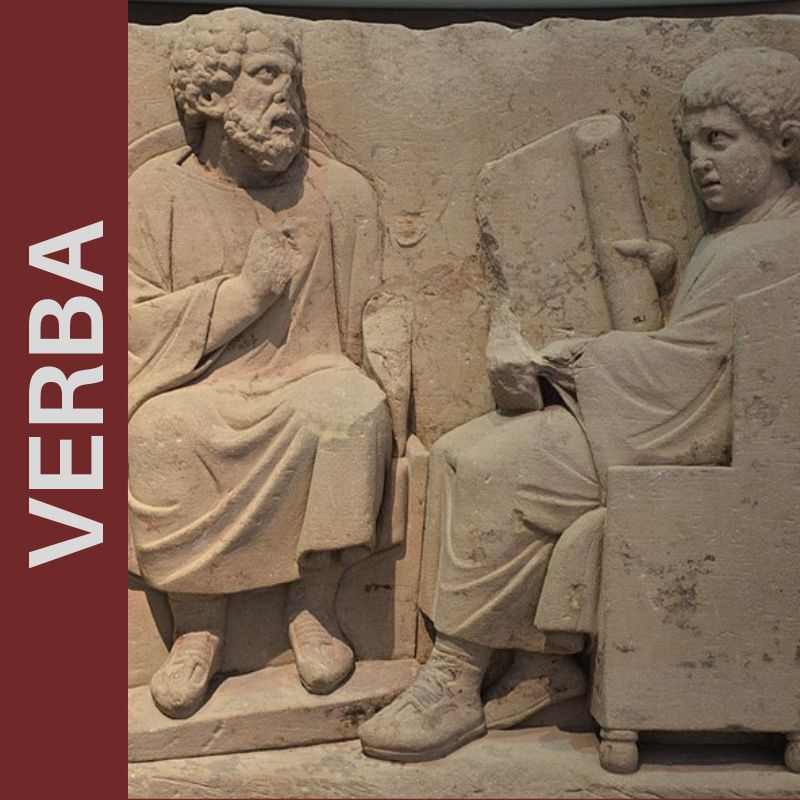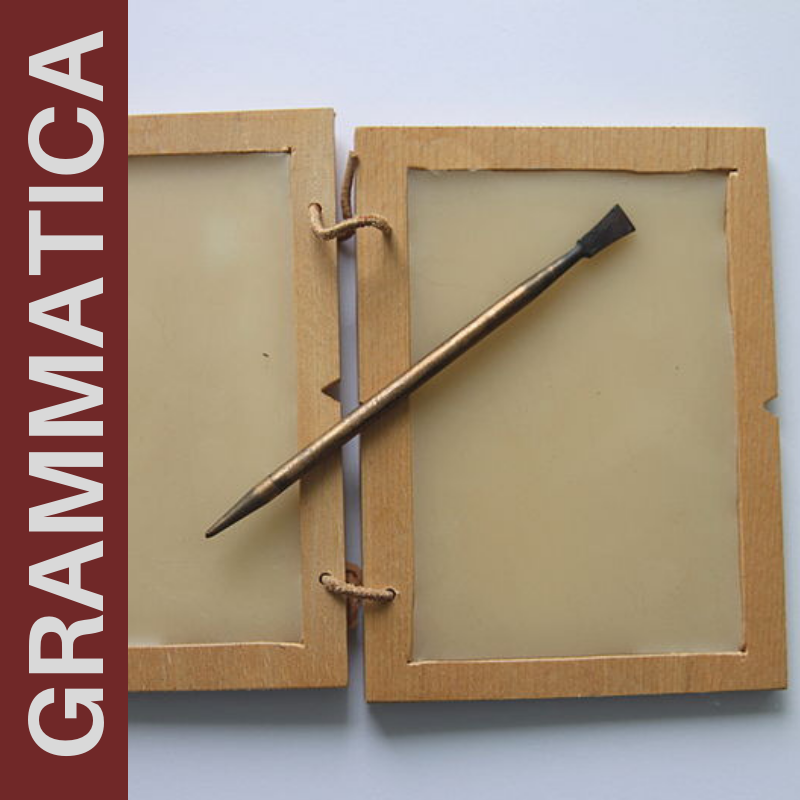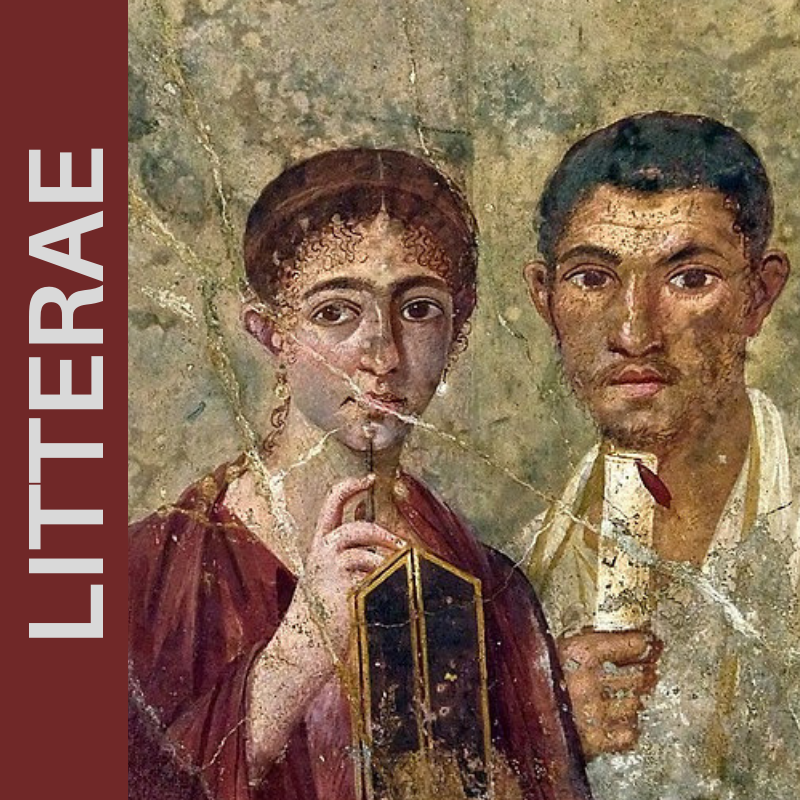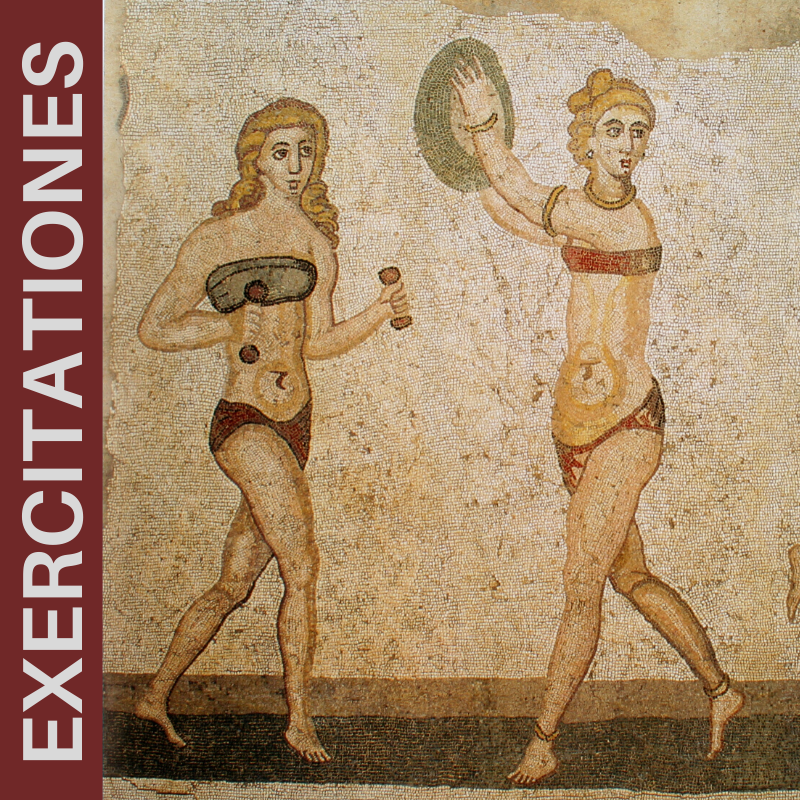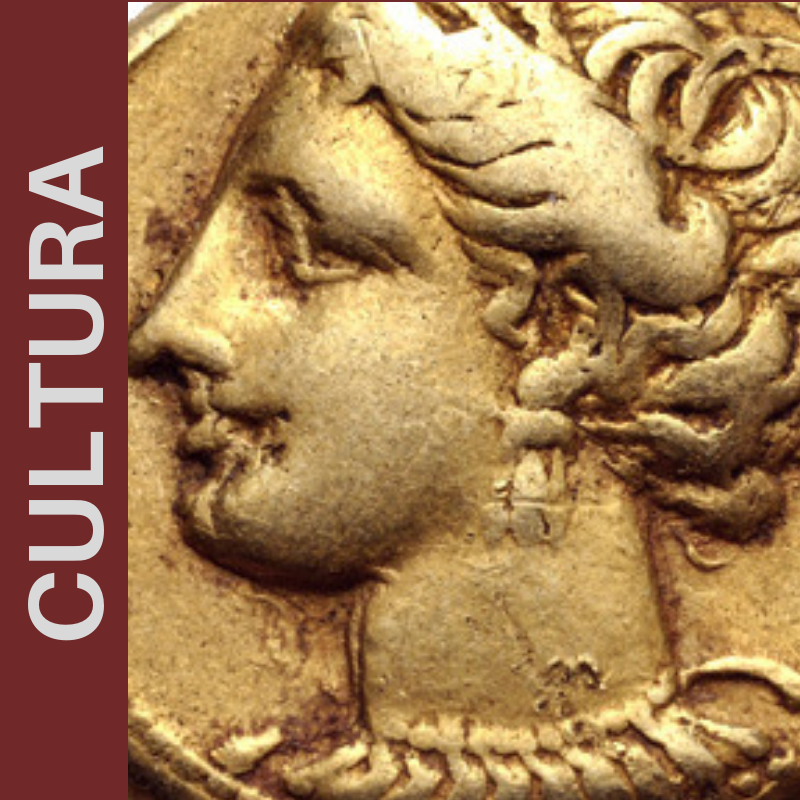§4a
Perpetua's Ladder
Tunc dixit mihi frater meus: Domina soror, iam in magnā dignatione es, tantā ut postules visionem et ostendatur tibi an passio sit an commeatus. Et ego quae me sciebam fabulari cum Domino, cuius beneficia tanta experta eram, fidenter repromisi ei dicens: Crastinā die tibi renuntiabo. Et postulavi, et ostensum est mihi hoc. Video scalam aeream mirae magnitudinis pertingentem usque ad caelum et angustam, per quam nonnisi singuli ascendere possent, et in lateribus scalae omne genus ferramentorum infixum. Erant ibi gladii, lanceae, hami, machaerae, veruta, ut si quis neglegenter aut non sursum adtendens ascenderet, laniaretur et carnes eius inhaererent ferramentis. Et erat sub ipsā scalā draco cubans mirae magnitudinis, qui ascendentibus insidias praestabat et exterrebat ne ascenderent. Ascendit autem Saturus prior, qui postea se propter nos ultro tradiderat (quia ipse nos aedificaverat), et tunc, cum adducti sumus, praesens non fuerat. Et pervenit in caput scalae et convertit se et dixit mihi: Perpetua, sustineo te; sed vide ne te mordeat draco ille. Et dixi ego: Non me nocebit, in nomine Iesu Christi. Et desub ipsā scalā, quasi timens me, lentē eiecit caput. Et quasi primum gradum calcarem, calcavi illi caput et ascendi.
Nota
dignātio, -ōnis f. - respect, esteem
an . . . sit an: “whether it is . . . or” -- an indirect question uses a subjunctive verb. You will learn more about this in Unit 9.
commeatus, -ūs m. - a furlough, a safe passage
fābulor, -ari, -atus (1) - to speak, converse (related to fabula)
fidens (gen. fidentis) - confident, boldcrastinus, -a, -um - of tomorrow, tomorrow’s
renuntio (1) - report, declare
aereus, -a, -um - made of bronze
mirus, -a, -um - wonderful, marvelous, astonishing
mirae magnitudinis: gen. of description
pertingo, -tingere, -tinxi, -tinctum - to stretch out, reach
angustus, -a, -um - narrow, straight
nonnisi - non nisi - “not unless”
per quam nonnisi singuli ascendere possent - an imperf. subj. in a relative clause of characteristic. You will learn more about these in Unit 10.
ferramentum, -i n. - iron implement
infigo, -figere, -fixi, -fictum - to fix, fasten
lancea, -ae f.- light spear
hamus, -i m. - hook
machaera, -ae, f. - short sword ( = Greek μάχαιρα)
verutum, -i n. - dart, javelin
si quis . . . ascenderet: an indefinite relative clause embedded in the result clause. quis = aliquis. After si, nisi, num, and ne the prefix “ali-” is not used on forms of aliquis, aliquid. Remember: “after si, nisi, num, and ne, all the ‘ali-s’ drop away.”
lanio (1) - to tear to pieces, mangle
inhaereo, -haēre, -haesi, -haesum - to stick to
neglegens, neglegentis (gen.) - careless, negligent
sursum - up, upwards
adtendo, -tendere, -tendi, -tensum - to stretch to, reach to (also spelled attendo; ad • tendo)
draco, -onis m. - serpent, snake
cubo, cubare, cubui, cubitum - to lie
ascendentibus - “against those ascending” (dative with a compound verb, discussed in Unit 9)
insidiae, -arum f. (pl.) - ambush, treachery
exterreo, -terrere, -terrui, territum - to terrify completely (ex • terreo)
ne ascenderet: ne introduces a fearing clause with the subjunctive (Unit 9). Translate “lest he climb up.”
ultro - willingly
aedifico (1) - to build, educate
converto, convertere, conversi, conversum - to turn about, change
vide ne te mordeat: - ne introduces an indirect command with the subjunctive (Unit 9). Translate “see (to it) that it not bite you”.
mordeo, mordēre, momordi, morsum - to bite
Iesu Christus, -i m. - Jesus Christ. Iesu is indeclinable; Christus, -i is 2nd decl. meaning “anointed one” from the Greek χριος.
desub - below, beneath (+ abl)
lentus, -a, -um - flexible, slow, lingering
eicio, -icere, -iēci, -iectum - to thrust out, drive out (e • iacio)
quasi . . . calcarem, calcavi: Translate “as if . . . I were stepping, I stepped.
illi: dative of possession (as in “Nomen mihi est Aelia”)
§4b
Perpetua and the Shepherd
Et vidi spatium immensum horti et in medio sedentem hominem canum in habitu pastoris, grandem, oves mulgentem. Et circumstantes candidati milia multa. Et levavit caput et aspexit me et dixit mihi: Bene venisti, teknon. Et clamavit me et de caseo quod mulgebat dedit mihi quasi buccellam; et ego accepi iunctis manibus et manducavi; et universi circumstantes dixerunt: Amen. Et ad sonum vocis experrecta sum, conmanducans adhuc dulce nescio quid. Et retuli statim fratri meo; et intelleximus passionem esse futuram, et coepimus nullam iam spem in saeculo habere.
hortus, -i m. - garden
habitus, -ūs m. - appearance, condition
pastor, -oris m. - shepherd
grandis, -e - large, grand
ovis, ovis f. - sheep
mulgeo, mulgēre, mulsi, mulsum - to milk
circumsto, -stare, -steti, -statum - to stand around, surround (circum • sto)
candidatus, -a, -um - clothed in white
multa milia: n. pl. in form referring to circumstantes candidati
levo (1) - to lift, raise (related to levis, -e)
teknon: “O child.” This is a Greek vocative.
clamo (1) - to call out, cry out
caseum, -ī n. - cheese
buccella, -ae f. - a morsel, small mouthful
manduco (1) - to chew
sonus, -ī m. - sound
commanduco (1) - to chew completely, chew to pieces
dulce nescio quid: “I-don’t-know-what sweet thing”
saeculo: “world”
§5
A Father's Lament
Post paucos dies rumor cucurrit ut audiremur. Supervenit autem et de civitate pater meus, consumptus taedio, et ascendit ad me, ut me deiceret, dicens: Miserere, filia, canis meis; miserere patri, si dignus sum a te pater vocari; si his te manibus ad hunc florem aetatis provexi, si te praeposui omnibus fratribus tuis: ne me dederis in dedecus hominum. Aspice fratres tuos, aspice matrem tuam et materteram, aspice filium tuum qui post te vivere non poterit. Depone animos; ne universos nos extermines. Nemo enim nostrum libere loquetur, si tu aliquid fueris passa. Haec dicebat quasi pater pro sua pietate basians mihi manus et se ad pedes meos iactans et lacrimans me iam non filiam nominabat sed dominam. Et ego dolebam casum patris mei quod solus de passione meā gavisurus non esset de toto genere meo. Et confortavi eum dicens: Hoc fiet in illā catastā quod Deus voluerit. Scito enim nos non in nostrā esse potestate constitutos, sed in Dei. Et recessit a me contristatus.
rumor, -oris m. - rumor
ut audiremur: translate “that we be given a hearing”
supervenio, -venire, -vēni, -ventum - to arrive, to come upon (super • venio)
taedium, -ī n. - weariness, disgust
misereor, miserēri, miseritum - to pity (+ dat.) (related to miser)
proveho, -vehere, -vexi, -vectum - to carry forth, convey
praepono, -ponere, -posui, -positum - to place (acc.) before (dat.) (prae • pono) (The use of datives with compound verbs will be discussed further in Unit 10.)
ne me dederis: ne + subj. (pres. or perf.) is a prohibitive subjunctive (Unit 9): Translate “don’t place...”
dedecus, dedecoris n. - disgrace, shame
matertera, -ae f. - maternal aunt
depono, -ponere, -posui, -positum - to put aside, give up (de • pono)
extermino (1) - to drive out, destroy.
ne . . . extermines: ne + subj. (pres. or perf.) is a prohibitive subjunctive (Unit 9): Translate “don’t destroy. . .”
basio (1) - to kiss
eris passa: “you will have suffered.”
iacto (1) - to throw
nomino (1) - to call by name, call (related to nomen, nominis n.)
quod gavisurus non essent: a causal clause with a periphrastic (or indirect) form made up of a future participle + imperfect subj. of sum. Translate “because he was not going to rejoice.”
conforto (1) - to strengthen, comfort
catasta, -ae f. - public stage used for selling slaves, sentencing criminals, or giving public lectures
scito: future imperative of scio (4). The future imperative gives a command with a definite reference to future time. Translate as a present imperative.
contristo (1) - to sadden, distress (related to tristis, -e)
Except where otherwise noted, material by Roman and Beyond: a Latin Curriculum is licensed under a Creative Commons Attribution-NonCommercial-ShareAlike 4.0 International License.
